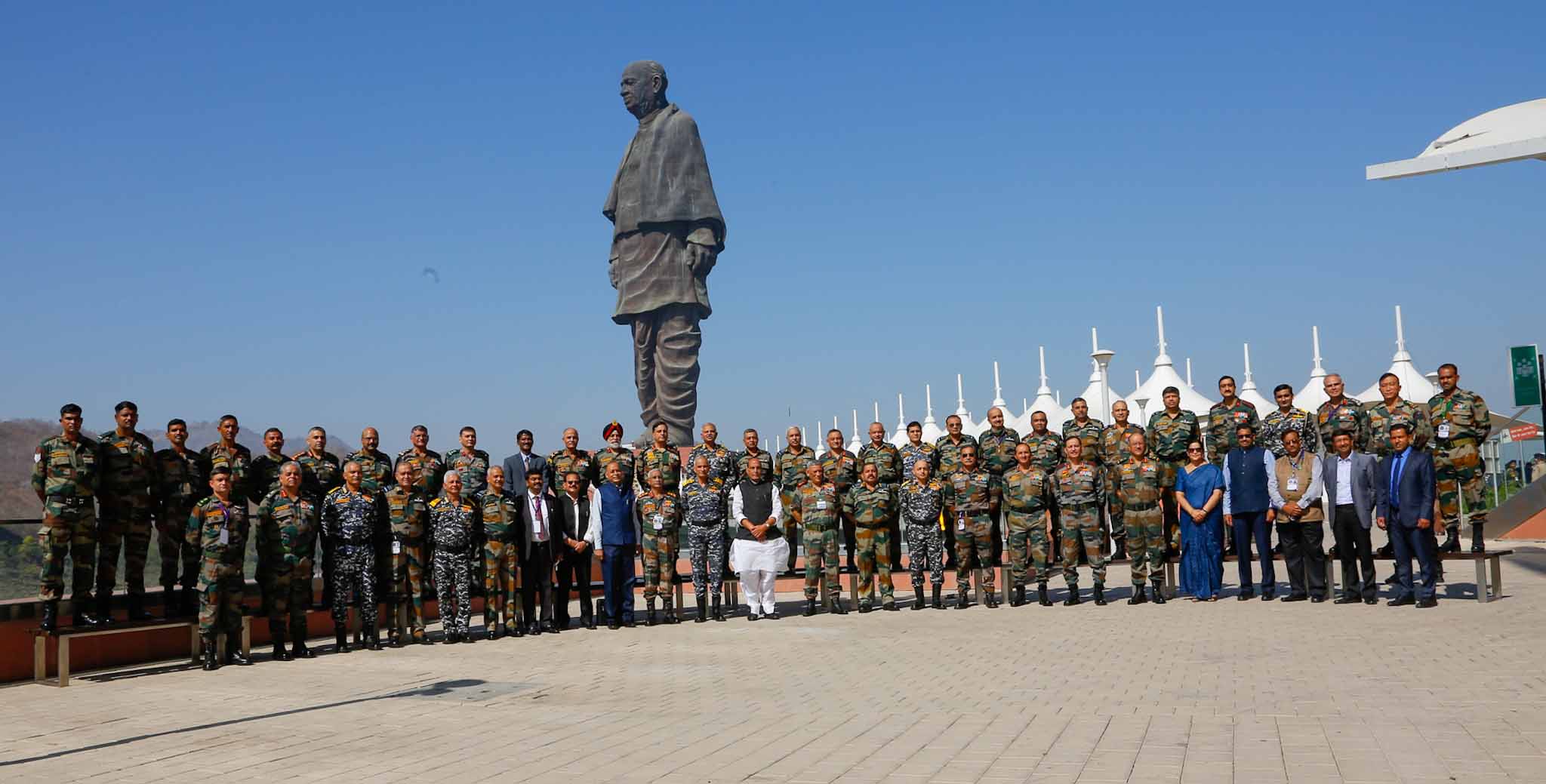Whosever idea it was to hold the Combined Commanders’ Conference (CCC) at Kevadia, Gujarat, it is packed with significance which strikes those aware of India’s post-Independence history still un-swept from under the carpet. The significance stands out vividly in the group photograph of the participants with Sardar Vallabhbhai Patel’s statue looming large behind them.
In the CCC is the country’s combined top level military leadership reviews the security situation and defence preparedness of the Armed Forces and deliberates on relevant organisational issues for evolving a joint military vision for the future.
Defence Minister Rajnath Singh was joined by the three Services Chiefs, the military commanders along with Secretary level officers from Defence Ministry from the second day of the conference. The Valedictory Session on the third and final day was chaired by Prime Minister Narendra Modi with National Security Advisor Ajit Doval also attending.
For the first time in a major change from the past, the scope of the CCC was expanded to the include about 30 junior commissioned and non-commissioned officers from the three Services. Key events included a series of discussions and deliberations on a range of issues pertinent to the Armed Forces and its role in nation-building, with the participation of the senior-most political and bureaucratic hierarchy, for the first time, multi-layered participation of military personnel.
The Defence Organisation since including the appointment of the first-ever Chief of Defence Staff and setting up of the Department of Military Affairs (DMA), and several important and multifarious issues affecting modernisation and transformation of the Armed Forces are currently under active consideration/ implementation.
Held in South Block for decades since Independence, it is only since the BJP government taking over that its venue began changing, In 2015 the CCC was held aboard INS Vikramaditya, India’s sole aircraft carrier, in 2017 at the Indian Military Academy, Dehradun and in 2018 at Jodhpur, Holding the CCC in Kevadia is no doubt considered a long overdue tribute to the Sardar, who not only very effectively and swiftly integrated India’s 562 kingdoms referred to as princely states, but also had many more sound and important suggestions for India’s security, particularly on China and Pakistan, which Nehru prevented from being accepted. India’s Armed Forces are still paying dearly for some of Nehru’s policies/decisions on both China and Pakistan. Seen in retrospect after Sardar Patel’s death, it became obvious how shabbily Nehru treated him and his family. Nehru also became a major impediment to India’s crucial security vis a vis China and Pakistan. India’s post- Independence history would certainly have been much different had the Sardar been given his due and if he had lived longer.
Another first for this CCC was that following the government’s directive, personnel below officer rank (PBOR) were made to attend this event. This move not only surprised many serving and retired personnel, but led to much criticism by many retired officers wanting to remain unnamed.
However, one retired officer who was quoted in The Wire, Major General Mrinal Suman (retired) dismissed all such criticism of including the junior and non-commissioned officers participation in the CCC as ‘motivated and short sighted’.
“There is nothing negative or adverse about involving PBOR (personnel below officer rank) in the CCC, as it only makes jawans (soldiers), JCO’s and NCO’s feel more involved in service matters by giving them an overall sense of belonging,” he said.
The CCC, he stated, will not be a grievance venting platform for the PBORs, and if the interaction works, it can be continued; and if not, it can be dispensed with. However, General Suman warned that all reformative moves need welcoming and that maintaining status quo continually leads to decrepitude.
A concluding comment in The Wire’s article by the writer, Rahul Bedi was that over decades, the cynical reciprocal relationship between India’s soldiery and the ruling party has proliferated, with ‘political expediency’ factored into the military’s operational plans and wider strategic moves. This reciprocal association has benefitted both sides: the politician successfully exploited the military’s gains for electoral profit, while the soldier earned promotion and possibly even lucrative employment after retirement, or both.
Meanwhile, ahead of the CCC General Rawat declared on Thursday that India’s military leadership will have to “more than match the political vision” that has mandated the creation of tri-service theatre commands to address India’s future security threats.

The writer is editor WordSword Features. He is also a strategic analyst and former spokesperson, Defence Ministry and Indian Army, and can be contacted at wordsword02@gmail.











